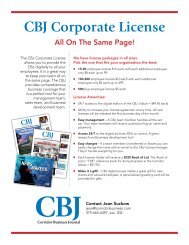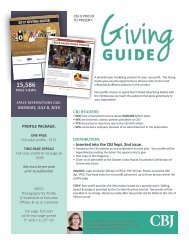CBJ's Largest Privately Held Companies 2018
You also want an ePaper? Increase the reach of your titles
YUMPU automatically turns print PDFs into web optimized ePapers that Google loves.
CRST International<br />
1<br />
CRST International continues to lead the pack of largest<br />
privately held companies in the Corridor, with some<br />
big acquisitions driving revenue at a time when organic<br />
growth has been hard to achieve.<br />
The Cedar Rapids-based company is one of the most<br />
diversified carriers in the country, with eight operating<br />
companies serving different segments of the market and $1.55<br />
billion in revenue. It is likely the largest privately held trucking<br />
company in the United States after a rival carrier, Schneider National,<br />
went public in 2017.<br />
CRST serves shippers with<br />
8,100 company drivers and<br />
independent contractors and<br />
about 6,100 trucks. In 2017,<br />
it was ranked the nation’s<br />
19th largest for-hire carrier by<br />
Transport Topics magazine,<br />
up from 24th in 2016.<br />
Being privately owned<br />
by the Smith family of Cedar<br />
Rapids has helped CRST<br />
take advantage of many<br />
growth opportunities while<br />
also taking care of its home<br />
DAVID RUSCH<br />
PRESIDENT & CEO<br />
community, according to<br />
CEO David Rusch.<br />
“Being privately held gives<br />
us a lot of flexibility in the<br />
marketplace because we can react much quicker to our shipper’s<br />
needs than some of the large publicly-held companies that have<br />
more bureaucracy,” Mr. Rusch said. Difficult decisions such as<br />
whether to acquire another company or make a major investment<br />
can be made faster, he added.<br />
Chairman John Smith and his wife Dyan have been leaders<br />
in the city’s recovery from the flood of 2008, showing confidence<br />
in the flood-affected downtown area by building a $36<br />
million office tower, donating more than $1 million to neighborhood<br />
rebuilding effort Block by Block and supporting wetlands<br />
restoration efforts in the Cedar River watershed that will<br />
reduce future flooding.<br />
CRST has drawn growth in recent years from its 2016 acquisition<br />
of California-based Gardner Trucking, which added<br />
about $400 million in revenue, and its 2015 acquisition of Pegasus<br />
Transportation, a Kentucky-based carrier specializing in<br />
time-sensitive loads such as blood plasma and pharmaceuticals.<br />
Without those acquisitions, Mr. Rusch said growth would<br />
have been elusive. Shipping demand rose rapidly when the<br />
economy first began recovering from the last recession in 2010.<br />
Many carriers had gone bankrupt, leaving the surviving, larger<br />
carriers with all the business they could handle. Those companies<br />
then went on a truck-buying spree, and by 2016, there was<br />
overcapacity, meaning carriers were unable to raise rates even as<br />
costs continued to escalate.<br />
“Our legacy companies, like most of our peers, were forced<br />
to cut fleet size over the last couple of years,” Mr. Rusch said.<br />
“Freight wasn’t strong, utilization dipped a bit and we just<br />
couldn’t get the drivers.” Without CRST’s recent acquisitions, he<br />
said overall revenue would have declined.<br />
Although shipping demand has picked up since last year,<br />
CRST and most other<br />
carriers have been<br />
hard-pressed to take<br />
advantage of it. Heavy<br />
Duty Trucking magazine<br />
reported that<br />
many shippers began<br />
having trouble as early<br />
as September 2017<br />
finding enough trucks<br />
to satisfy customers’<br />
shipping needs. That<br />
shortage has bloomed<br />
into a “capacity crisis”<br />
in recent months.<br />
“It’s the worst driver<br />
shortage I’ve seen<br />
in my 38 years in the<br />
industry,” Mr. Rusch<br />
said. “The only difference<br />
between 2010<br />
and today is that none<br />
of us can get drivers.”<br />
CRST announced a<br />
pay enhancement program<br />
in January that<br />
will cost it about $14<br />
THE TEAM<br />
EXECUTIVE TEAM<br />
John Smith, Chairman<br />
David Rusch, President & CEO<br />
Hugh Ekberg, COO<br />
BOARD OF DIRECTORS<br />
John Smith, Chair<br />
Dyan Smith<br />
Ian Smith<br />
John Bowron<br />
Tony Golobic<br />
Dave Kulik<br />
Robert Lake<br />
Peter Latta<br />
John Larkin<br />
Henry Royer<br />
SUPPORT TEAM<br />
Cedar Rapids Bank & Trust<br />
RSM US LLP<br />
Simmons Perrine Moyer<br />
Bergman PLC<br />
million this year in an effort to attract and retain more drivers.<br />
One operating company, CRST Specialized Transportation Services,<br />
introduced a $12,000 bonus program that pays the driver<br />
an extra $1,000 per month for the first 12 months on the job.<br />
The inability of trucking companies to raise rates during the<br />
recent period of overcapacity has slowed the company’s pace toward<br />
$2 billion in annual revenue, Mr. Rusch said, but he’s confident<br />
CRST can reach the goal within the next couple of years.<br />
“We’re entrepreneurial,” Mr. Rusch said. “We just don’t take<br />
‘no’ for an answer. When there’s a challenge out there, we have<br />
solutions. We understand them, we know what we have to do<br />
to fix them and I’m confident in my management team that we<br />
can execute and achieve our goals.”<br />
- Dave DeWitte<br />
PHOTO MIRANDA MEYER<br />
6 CBJ’S LARGEST PRIVATELY HELD COMPANIES <strong>2018</strong>
















